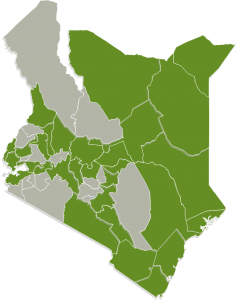| CATEGORY: | Research and Development |
| CSA PROJECT: | Climate Risk Profiling |
| SCALE: | Sub-national |
| LOCATION: | Baringo, Lamu, Isiolo, Laikipia, Elgeyo Marakwet, Mandera, Machakos, Nyandarua, Nyeri, Siaya, Kilifi, Tana River, Kwale, West Pokot, Makueni, Meru, Embu, Garissa, Busia, Taita Taveta, Kajiado, Marsabit, Kakamega, Tharaka Nithi, Uasin Gishu, Nakuru, Wajir, Kisumu, Kajiado, Homabay, Kericho |
| PERIOD OF THE PROJECT: | 2015-2017 |
| GRANT SIZE OF THE PROJECT: | N/A |
INTERNATIONAL CENTRE FOR TROPICAL AGRICULTURE (CIAT)

SUMMARY OF ACTIONS
The organization delves into climate smart agricultural activities that deliver resilience building goals in agriculture and food systems through sustainable management of landscapes and ecosystems; leveraging markets for farmers; and mainstreaming nutrition considerations in agricultural programs for sustained food and nutritional security. CIAT’s work on climate risk profiling provides an analysis of the underlying causes of vulnerability, ongoing adaptation strategies and existing off-farm services available for combating the risks associated with the climate hazards, with recommendations for potential adaptation. The profiles also give snapshots of the enabling environment for building resilience by providing a synthesis on the policy, institutional and governance context, and possible pathways to be pursued to build institutional capacities for effective redress of potential future climate risks.
CONTEXT
Evidence accruing from farmers, researchers and the policy process suggests that attainment of sustainable agriculture and food systems under increasing threats from climate change impacts can be achieved through mainstreaming resilience building interventions in agriculture. However, success will be guided by baseline knowledge of the prevailing vulnerability context; current on-farm adaptation strategies; off-farm climate risk management interventions from policy, institutions and governance; and potential adaptation options for responding to the anticipated future climate change risks.
OBJECTIVE
The overall objective of this project is to develop climate risk profiles Kenyan counties, by evaluating risks under current and projected future, identification of climate change-related vulnerabilities for the population, livelihoods, investments, and the environment; identification of potential climate risk response strategies across agriculture value chains; and evaluating institutional, program, and policy enabling environments for resilience building.
KEY INTERVENTIONS
| FARM LEVEL | TARGET(NO OF FARMERS) | CSA INDICATORS MONITORED |
| – | – | – |
| BEYOND FARM LEVEL | TARGET BENEFICIARIES | INDICATORS MONITORED |
| Policy formulation
|
Farmers, Agricultural Extension services, Weather and Climate Services providers agro-input supply chain, Transporters, Traders, Agro-Processors, storage and handlers, County governments departments, stakeholders, etc. | · No. of policy briefs developed
· No. of fliers developed and distributed to target beneficiaries · No. of meetings held with each of: policy makers, climate services providers, farmers, value chain actors, and stakeholders |
| Research | Farmers, Agricultural Extension services, Weather and Climate Services providers, value chain actors ( agro-input supply chain, Transporters, Traders, Agro-Processors, storage and handlers), County government departments, stakeholders, etc. | · No. of field surveys conducted and reported
· No of Focus Group Discussions conducted · No of validation and results dissemination conferences held · No of research papers published · No of policy briefs published · Agriculture and demographics (food security status, poverty rates etc.), vulnerability to climate risks, institutional capacity to deliver on CSA programs/projects · Climate/weather indices i.e temperature, precipitation-frequency and variation · Climate hazards-drought and floods |
| Communication
|
Farmers, Agricultural Extension services, Weather and Climate Services providers, value chain actors ( agro-input supply chain, Transporters, Traders, Agro-Processors, storage and handlers), County government departments, stakeholders, etc. | · No. of policy briefs developed and shared with policy makers
· No. of fliers developed and shared · No. of electronic and print media reports presented to public
|
PARTICIPATION IN KEY CLIMATE &AGRICULTURE NETWORKS
CIAT is a member of the Climate Smart Agriculture MultiStakeholder Platform.
INVOLVEMENT IN CSA
RELEVANCE OF CSA MSP TO WORK
- Research
- Policy formulation
- Knowledge dissemination
- Coordination and networking
- Technology transfer
- Networking
- Learning and exchange of what works and where
- Policy influence on CSA, sustainable landscape management and ecosystems
- Reporting and showcasing success stories
- Information on climate smart agriculture.
- Capacity building on CSA technologies and practices
RECOMMENDATION ON WAYS TO SUPPORT MSP
- Disseminating climate smart agriculture knowledge, technologies, and practices
- Capacity building of key actors engaged in implementation of CSA interventions
- Mobilizing and facilitating dialogue among stakeholders on CSA related issues including response actions
- Providing scientific evidence to support stakeholders implementation of CSA technologies and practices
- Monitoring, evaluation and audit of climate smart agriculture interventions being implemented by stakeholders to enhance accountability, progress and outcomes.
LESSONS LEARNED/ CHALLENGES IN THE CSA PROJECT IMPLEMENTATION
- Stakeholders are aware of the impacts of climate change in all stages of the agricultural value chains.
- The value chains are vulnerable to wide ranging biophysical and socioeconomic factors including: pests and diseases; environmental degradation; changes in commodity supply and demand; price fluctuations; logistical and infrastructural risks; financial, monetary, fiscal and tax policies; political risks; and security-related risks.
- Opportunities for adapting value chains to climate change impacts exist.
More comprehensive risk analysis beyond climate is required in order to build resilience in agricultural value chains.
RELEVANT LINKS & REFERENCES
ORGANISATION INFORMATION AND CONTACT PERSON ADRESS FOR FOLLOW UP
Name: International Center for Tropical Agriculture
Email address: CIAT-Kenya@CGIAR.ORG
Phone address: 254 721 574967
Organizational Physical address: Duduville Campus, Kasarani, Nairobi
Organizational Website: https://ciat.cgiar.org/
